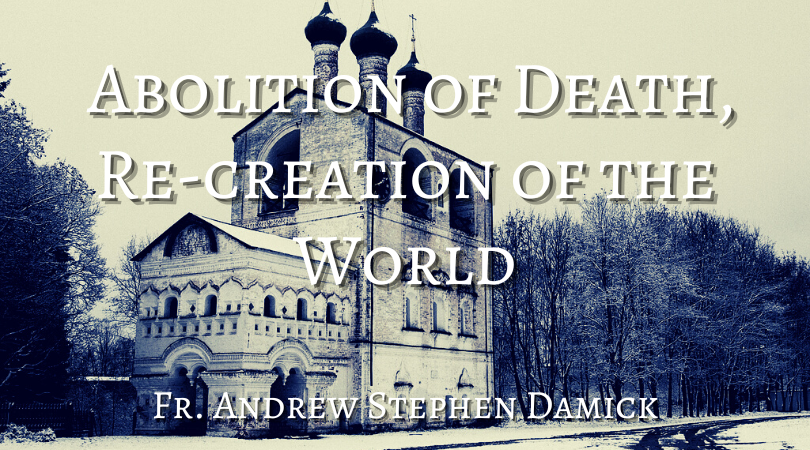
Five days before the Nativity of Christ, the Orthodox Church celebrates the great hieromartyr Ignatius the God-bearer of Antioch. As he was traveling to Rome to be torn apart by lions, he wrote six epistles to Christians who met with him along the way, as well as an additional one sent ahead to the Roman Christians. Among these epistles is one sent to the Christians of Ephesus, in which he offers a meditation on the birth of Jesus as the nineteenth chapter. It begins this way:
Both the virginity of Mary and her giving birth escaped the notice of the prince of this age, as did the Lord’s death – three mysteries of a cry, wrought in the stillness of God.
When we consider the great feast of Christmas, the feast of Christ’s birth, we might well think of the virginity of the Theotokos – it is, after all, a major frame for the miraculous birth of the Lord.
But would we connect these “mysteries” (as St. Ignatius calls them) with the Lord’s death? It seems out of place to bring the crucifixion in when all this joy is being contemplated. Let’s continue:
How then was he made manifest to the ages? A star shone forth in heaven brighter than all the stars, and its light was ineffable and its novelty produced astonishment; all the other stars, with sun and moon, gathered in chorus about this star, and it outshone them all. There was perplexity as to the origin of this novelty, so unlike the others.
We read in the Gospel according to Luke that when the shepherds were given the news of the birth of Jesus, a multitude of the heavenly host sings praises to God. We might consider the phrase heavenly host to be simply a reference to the angels (and it is), but it is the angels particularly in their association with the heavenly bodies – in St. Ignatius’s words here, “the other stars, with the sun and moon, gathered in chorus.”
There is one other place in the Scriptures where the stars are said to sing, at the creation of the world, “when the morning stars sang together and all the sons of God shouted for joy” (Job 38:7). So there is a pairing of the birth of Christ with the creation of the world.
When the world was created and man as the crown of creation, evil was soon introduced, and thus, death entered into human experience (Gen. 3), setting the destiny of mankind to be prisoners of the evil one in Hades, the “dust” of our death swallowed up by the serpent (Gen. 3:14, 19).
St. Ignatius goes on to say:
Thus all magic was dissolved and every bond of wickedness vanished; ignorance was abolished and the old kingdom was destroyed, since God was becoming manifest in human form for the newness of eternal life; what had been prepared by God had its beginning. Hence everything was shaken together, for the abolition of death was being planned.
Note what he says here ends because of the coming of the Lord – magic, bonds of wickedness, ignorance, and the old kingdom. What he is describing here is the dark world under paganism, the world under the domination of the demons worshiped by the nations. Finally, as he says, “the abolition of death was being planned.” The whole purpose of the incarnation of the Lord celebrated at Christmas was to begin the mission of death’s destruction. As both God and man Himself, Jesus is the agent of God sent to defeat “the last enemy, which is death” (1 Cor. 15:26).
So as odd as it might seem to be contemplating the divine-human baby in the manger, it turns out that St. Ignatius is merely stating in his own words what St. Paul had taught just a few decades earlier:
Since therefore the children share in flesh and blood, He Himself likewise partook of the same things, that through death He might destroy the one who has the power of death, that is, the devil, and deliver all those who through fear of death were subject to lifelong slavery. (Heb. 2:14-15)
St. Paul says exactly what St. Ignatius says – the Lord partook of flesh and blood, becoming incarnate in order that through death He would defeat “the one who has the power of death, that is, the devil.” Thus, because of the entrance into our humanity of Jesus Christ, the Lord of Glory, the Wisdom, Word, and Power of God, we can be rescued from slavery to the dark powers, rescued from domination under the old kingdom of darkness. With the destruction of death which came in at the beginning of the world, the world now is re-created in Christ.
This article was originally written for the Orthodox Exchange magazine.



